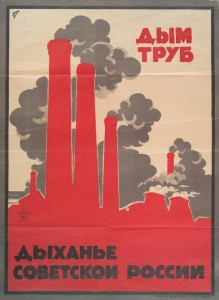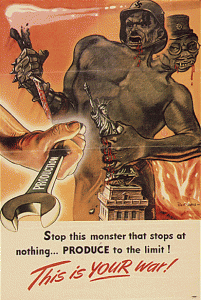Tag Archives: poetry
Just Modernity Things
Blog Post 9/13/2016
Carl Marquis-Olson
We Grow Out of Iron and The Ion Messiah
Gastev’s poem and his background represent a modernizing Russia. Gastev was a factory work, a member of the proletariat which was the fastest growing class of people and the new face of Russia in the early 20th century. He was a peasant who became literate and politically active. His profession and class play an increasingly important role in Russian society and according to Marxists, his class occupies the most politically crucial role in the new socialist order. After all Gastev is a socialist.
How do poems, specifically his poem, represent characteristics of modernity? The poem focuses largely on the material world. He describes the tools of industry: “workbenches, hammers, furnaces” etc. and the factory they are found in. He personifies the factory, growing taller and stronger as “fresh iron blood pours into my veins”. The very fact that he describes a factory, a productive enterprise made to produce materials, is evidence enough of this theme of materialism and in this way represents this characteristic of modernity. The poem concerns itself solely within the realm of man and machine. It captures the idea of progress and the changing world, it’s inevitability as the factory shouts “Victory shall be ours!”
Kirillov’s poem and Kirillov’s orgins are similar to Gastev’s. However, instead of celebrating the factory he celebrates the proletariat with his poem. He equates the common factory worker to god. He says “There he is – the savior, the lord of the earth. / The master of titanic forces… We thought he would appear in a sunlight stole, / With a nimbus of divine mystery,” His atheistic ode to humankind’s central place in the universe represents the humanism, secularism and scientific thought of modernity. He portrays the working man as the prophet, drawing a parallel with Christ’s central role in deliverance and the saving of humanity. Instead of god saving mankind it is man who will free and deliver the people of the world. This theme of nihilism and humankind’s supreme preeminence relates to this very secular aspect of modernity.
The Fallacy of Industry
Both Vladimir Kirillov and Aleksei Gastev express their admiration of the growing collectivization of industry in revolutionary Russia through their free verse poetry. The poets envision industry as the cure to class struggles that plagued revolutionary Russia, for under a rational and efficient system of production, all workers will be equal. Kirillov tells his readers that the leader of Russian industry may be a common man, “From the suburbs,” ((Vladimir Kirillov, “The Iron Messiah,” in Popular Poetry in Soviet Russia, (Berkeley: University of California Press, 1929), 216)) with enough power and charisma to bring citizens “to eternal fraternity” ((Kirillov, “The Iron Messiah,” 216)). Kirillov seeks to empower the average Russian worker, engaging in a form of mass politics to mobilize the working class.
Gastev paints the factory floor with images of heaven, rising Christlike out of the building to bring Russia to a new age of progress and pride. Rather than tire from work, Gastev boasts that “iron blood pours into my veins.” ((Aleksei Gastev, “We Grow Out of Iron,” in A Treasury of Russian Verse, edited by Avrahm Yarmolinksy (New York: Macmillan Company, 1949), 252)) Kirillov and Gastev put their faith in Russian industry, worshipping work as a deity. But does their veneration neglect the true lot of the peasant? They make no note of how industry could continue to exasperate the struggle of the revolutionary-era peasant. In the face of this poetic naivety, is it any wonder that workers’ quality of life in the Soviet Union plummeted?
Revolutionary Poetry
With the rise of literacy in Russia, literature became a more effective way to spread ideas throughout the people. Poetry stands out from the other forms here due to it’s rhythm. It is easier to remember stanzas of poetry than prose. This makes poetry a fantastic way to spread revolutionary ideas as well as the cost of the revolution.
Maksimilian Voloshin writes about how often progress is reached by some sort of sacrifice. In his poem, “Holy Russia” he describes the destruction that has come as a result of the revolution. “You yielded to passion’s beckoning call, And gave yourself to bandit and to thief, You burned your barns and fired your mansions, Pillaged your ancient house and home, And went your ways reviled and wretched, The handmaid of the humblest slave.” (( Voloshin, Holy Russia, http://soviethistory.msu.edu/1917-2/culture-and-revolution/culture-and-revolution-texts/holy-russia/ )) Voloshin tells of a Russia that has been torn apart by revolution, but that has the ability to make tremendous progress, something that would be positive to hear after years of brutal civil war.
Meanwhile, poets such as Kirillov and Gastev wrote on the glorious aspect of the revolution that came out of industrialization. In the poems, “Iron Messiah” and “We Grow Out of Iron” a new, magnificent future is made possible by the revolution, which was made possible by the machine. The machine allowed the proletariat to rise, and it will continue to allow for equality. Kirillov writes, “All of steel, unyielding and impetuous; He scatters sparks of rebellious thought,” this emphasizes the importance of technology in the minds of the revolutionaries. ((Kirillov, Iron Messiah, http://soviethistory.msu.edu/1917-2/culture-and-revolution/culture-and-revolution-texts/the-iron-messiah/ )) The machine represents power, equality, and progress, all which were goals of the revolution. This can be seen in the writing of Gastev, “I shall not tell a story or make a speech, I will only shout my iron word: “Victory shall be ours!”” ((Gastev, We Grow Out of Iron)) The use poetry to expand this message to the people emphasizes the importance of continuing to produce for the state using the technology that set them free.
These poets help to inspire the people that this suffering during the revolution is for a greater cause, but also that the very machines that made their lives harsh were the ones that liberated them. I think it is very interesting how the description and imagery of heavy machinery would fit right into a Western capitalist propaganda ad, but it can also be used to inspire the workers.

“The smoke of chimneys is the breath of Soviet Russia” https://en.wikipedia.org/wiki/History_of_the_Soviet_Union_(1927–53)
Rupert Brooke’s Great War Poetry
Author: Rupert Brooke was born in England, in 1887. Brooke, renowned for his World War I poetry, attended Cambridge University on a scholarship and was eventually commissioned to Britain’s Royal Naval Division. His premature death was the result of a mosquito bite that gave him septicemia on April 23, 1915.
Content: The content of Brooke’s poetry is striking. There is a stark contrast between the majority of Great War poets who lent their prose to engraving our imaginations with repugnant images of trenches, diseases, and death, to Brooke’s stanzas that could make a man or woman leave the comfort of their home to rather charge through no-man’s land with bayonet in hand. He is extremely optimistic about the war.
Language: Poetry of this caliber is difficult to read. The language is flowery, and the line breaks sometimes make it hard to complete the whole image which Brooke’s is trying to portray. Perhaps the language would come more easily had it been read by an Englishman one hundred years ago.
Audience: All of England. This is very romantic, pro-nationalist poem that is written for anyone who is scared of, or willing to help the war effort.
Intent: Brooke’s intent is to motivate. Also, to elicit a sense of national pride and honor which can be achieved through sacrificing yourself for England.
Message: Choose glory over life; for there is nothing greater than fighting for England. “But, dying, has made us greater gifts than gold.” He also implies that death is release from this world, which Brook’s seems to think is somewhat dreaded, and that the manner in which you die on the battlefield makes one “Rich” in a sense that is more significant that monetary wealth. Simply put, Brooke’s message is that dying for England is greater than merely living for England.
Consequences of the Industrial Revolution through “Silesian Weavers”
“A curse on this lying father-nation/ Where thrive only shame and degradation”
With a great deal of good always comes a fair amount of bad. So when the Industrial Revolution took off, along with the economy and development of machinery, the poor treatment of workers came to light. This neglect for the welfare of laborers is brought to attention by Heinrich Heine, author of “Silesian Weavers”. In this poem, Heine uses strong negative diction to impassion his audience, in turn sparking the development of a constitution for Prussia. Particularly striking word choices include the repetition of the word “curse”, “gloom-enveloped eyes”, “funeral shroud”, “dank rot”, and “cheerless”, among others. Heine uses these negative words to illustrate the mistreatment of laborers during the time. He points a finger at the government, in particular the king himself (“A curse on the king…/Who was not moved even by our grief”), in order to draw attention to the main cause of this degradation of workers. The quote at the very beginning of this post highlights the sentiments of Heine and his supporters during this time of ill-treatment. This particular line suggests that the nation has been reduced to a country that can only host shame and degradation, and no longer has a place for honor and respect in its labor system.
This situation was not exclusive to Silesia, but was prevalent throughout Europe during the Industrial Revolution. The poor treatment of workers ignited a revolution within the Industrial Revolution, a revolution of workers seeking respect. It inspired workers to pursue better treatment, working conditions, and rights.
Although in America and many parts of Europe, people work in the presence of humane conditions, American and European corporations run countless enormous factories in third-world, developing countries in which the workers are exploited, similar to what occurred during the Industrial Revolution. In these establishments, workers are paid close to nothing for hours of grueling, tedious labor. We do this because it ensures greater profit for our corporations. Obviously it is unjust, but why do countries repeat mistakes that have been made in the past? Is it because we have the power to domineer over less fortunate nations? Do these workers have the capability to ignite a movement against exploiting corporations, such as what occurred in Prussia? Why aren’t we taking more action against this exploitation of foreigners working for our companies? Is it because we feel removed, distant, and unconnected to these people because they are working thousands of miles away? We certainly have the resources and power to end this exploitation, but no great measures are being taken to end it.

